Last Updated: 23/07/2025
Common Rabbit Behaviours Explained
From a happy binky to an anxious thump, your rabbit is always trying to tell you something. Our guide helps you interpret the subtle cues and common behaviours of your bunny. Unlock their unique language to know if they're content, scared, or showing affection, and deepen your connection.
Author: Dr Nicole du Plessis BVSc (Hons)
Reading Time: 9 minutes - short read
Rabbits, often seen as quiet and gentle creatures, have a rich and expressive language that goes beyond simple vocalisations. Unlike dogs and cats, rabbits primarily communicate through body language, facial expressions, and interactions with their environment. While it may take some time to decipher their cues, understanding your rabbit's unique communication style will reveal a world of emotions and thoughts.
When discussing rabbit language, remember that rabbits are not predators like dogs and cats, but prey animals. Their position in the food chain has led to them developing specific behaviours that are very subtle. They will also hide their behaviours and stay on alert if they do not feel comfortable, and so it is important to ensure that all rabbits have a safe, calm, quiet, and consistent environment at home. Many rabbits also require some time to settle in, and may not fully display their range of behaviours until they are comfortable in their new environment. Each rabbit is different, and some bunnies may relax the day they get home, but some may take up to a year to fully trust that their new home is safe!
While every bunny has their own personality and character, there are a few characteristics that seem to apply to all: rabbits are funny, capricious, good actors, a little bit manipulative, and they definitely know how to use their natural charm to get what they want from you (hint: it is usually head rubs and treats).
Here is a little guide to help you understand common bunny behaviour and expressions of body language, so you can learn how to understand 'rabbit'.
In this article
- Thumping
- Flicking their back feet
- Grinding their teeth
- Running in a circle or figure of 8 around you
- Rubbing their chin on things
- Fainting
- Binkying
- Leaving droppings everywhere
- Growling and Lunging
- Trying to "mate" with your dog, your cat or even soft toys
- Tipping over, or throwing their bowl
- Gnawing at cage
- Nose Bonking
- Urine spraying
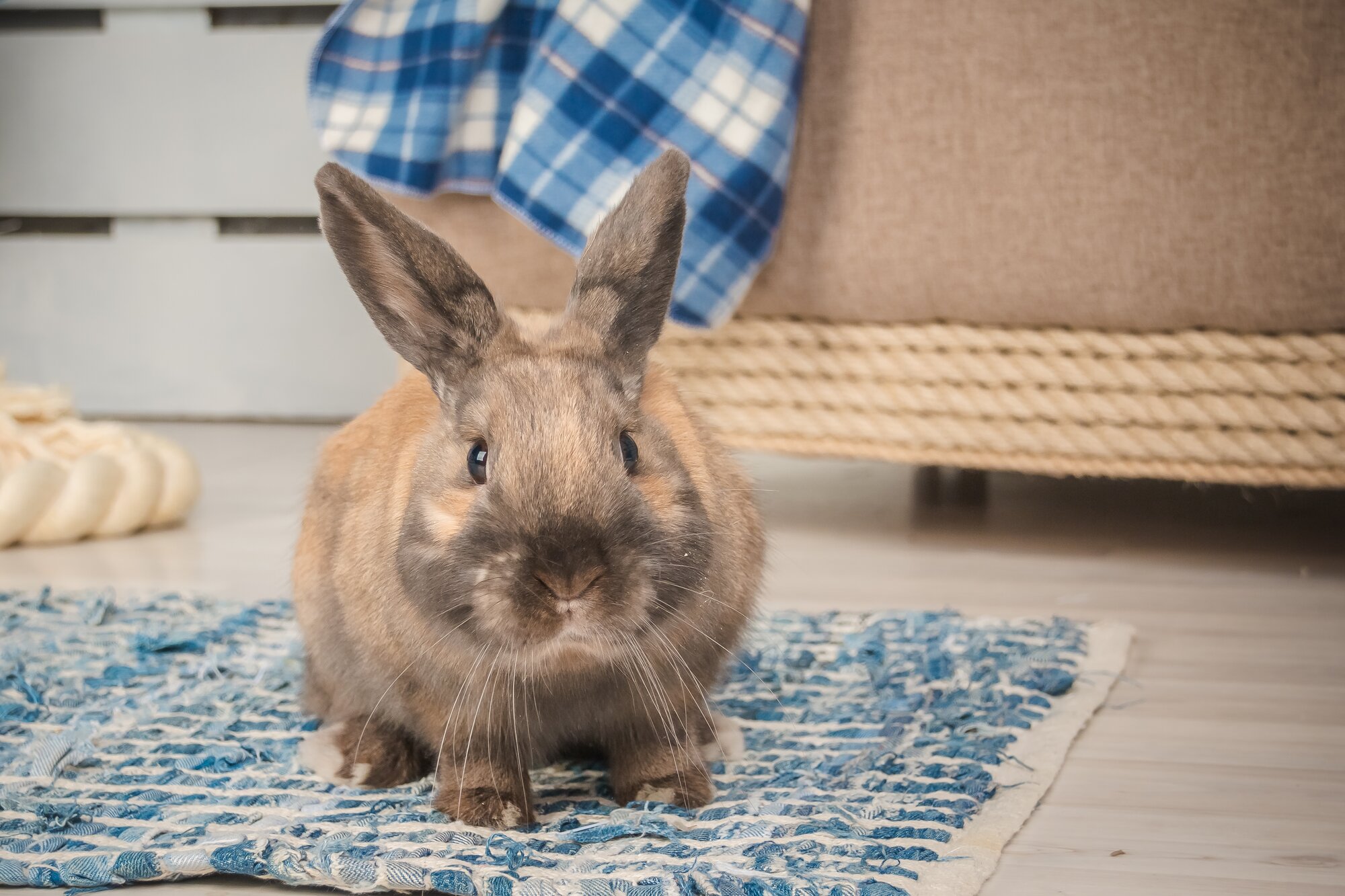
Thumping
What they are saying: 'I'm angry, annoyed or scared.'
THUMP! We are all familiar with this part of rabbit behaviour thanks to the movie Bambi. When they are angry or scared, rabbits use their muscular hind legs to drive their back feet into the ground, producing a loud thunk noise. We think this serves to warn other rabbits of potential danger. Rabbits will also do it to convey annoyance, such as when their meals are late, after they've had their nails clipped, or when they are told off for doing something they shouldn't.
Flicking their back feet
What they are saying: 'I'm upset'.
This behaviour means that your bunny is offended, upset or angry. This behaviour may arise after you've done something that your rabbit feels is a gross injustice, such as brushing or grooming out loose fur. You may have also said no to another treat. They'll run away from you while flicking their back feet at you, then turn around, sit, and glare.
Grinding their teeth
What they are saying: 'I'm content. Or, my teeth hurt.'
This behaviour is similar to purring in cats, where they can make that sound to convey comfort and happiness, or they may also do it when they are painful or uncomfortable.
Many rabbits will tooth purr when they get a head and cheek massage, or will do it when they are lying down comfortably. Happy tooth grinding is usually associated with a relaxed, eating, and comfortable rabbit. It also can sound more like a chittering noise.
On the other hand, painful rabbits can sit hunched up, refuse to eat, and appear tense and unhappy while making a grinding noise that can be harsher and crunchier in sound than the happy tooth grinding. If you are concerned, consult your vet ASAP. Inappetence in rabbits is a medical emergency.
Want to know more? Read all about Dental Disease in Rabbits and Gut Stasis in Rabbits and Guinea Pigs.
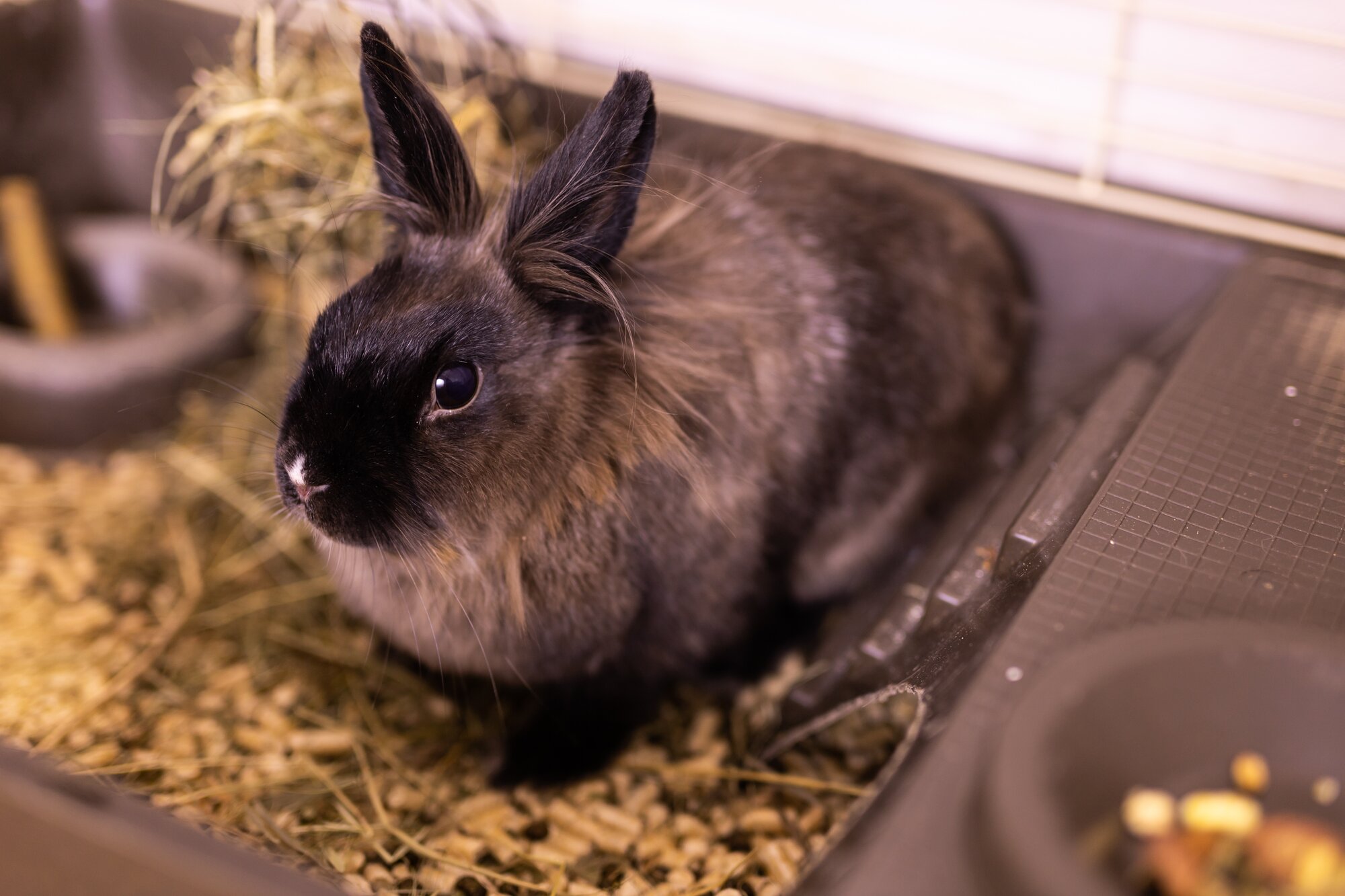
Running in a circle or figure of 8 around you
What they are saying: 'I'm excited'
Your rabbit may be excited about a few different things. Many rabbits will do this around meal times, or if they see the treat container come out. They may also do this to new visitors to the home. Some rabbits will also make a honking noise at the same time.
Rabbits that are not desexed may also be viewing the person as a potential partner, and that person may end up being sprayed with urine, have their ankles nipped, or their feet mounted! Another great reason why we strongly recommend desexing both male and female rabbits.
Rubbing their chin on things
What they are saying: 'MINE!'
This behaviour is similar to 'bunting' seen in cats. Bunnies have glands under their chin that they use to mark their territory. Rabbits can chin people, furniture, object, and food. You will often see rabbits chinning things in a new place, such as in a consultation room at the vets. It is very individual as to how much and how often a rabbit chins things. Some rabbits will chin everything, whereas some may be more picky as to what they want to chin.
Fainting
What they are saying: 'I'm content!'
This one can be very alarming to new rabbit owners! Your rabbit might be zooming around one minute, then suddenly stop, and throw themselves on their side. Another name for this behaviour is the 'dead bunny flop' This is actually a great sign that your rabbit is happy and content, and also feels safe in their environment. Most rabbits will flop for up to several minutes, then sit up and slowly doze off, or do a bit of grooming. Some rabbits can flop very dramatically, and even accidentally do a barrel roll!
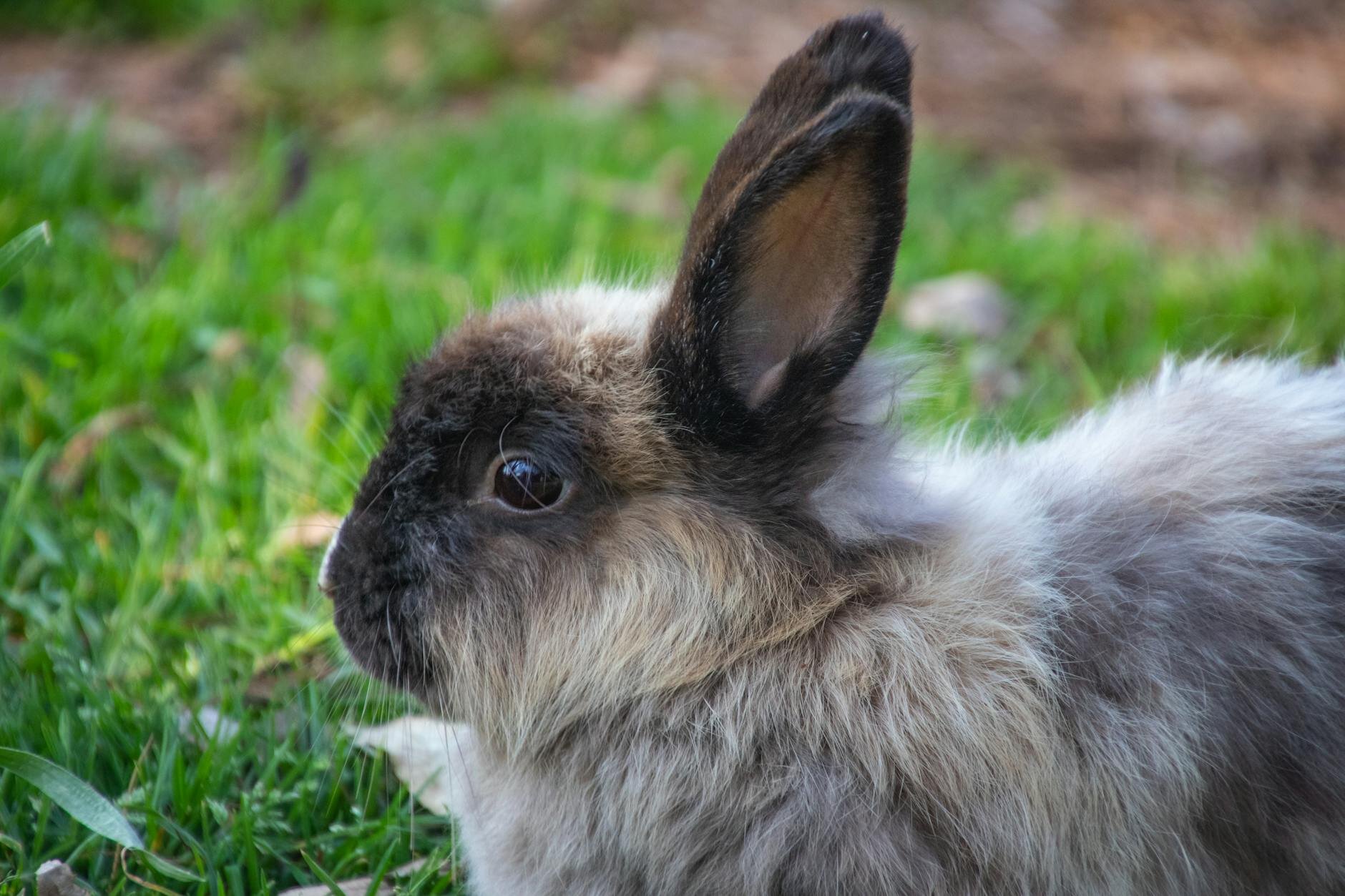
Binkying
What they are saying: 'I'm having a great time!'
Another sign of a happy and content rabbit is a binky. Rabbits binky suddenly, and may do it in the middle of a zoomie session. When binkying, a rabbit leaps high into the air, and may twist their bodies and kick their feet. They may also shake their head and ears.
Some rabbits do very extravagant binkies, and some contain their joy to just a little jump and flick. It seems to be very individual to each rabbit, and some rabbits may never be caught binkying even though they have a great life. If your rabbit is a regular binky-er and suddenly stops, a vet visit is in order to check for any problems and signs of pain. We have seen older rabbits that haven't binkied for some time suddenly start up again once their health problems are appropriately treated!
Leaving droppings everywhere
What they are saying: 'I am marking my territory.'
If your bunny is having accidents, it is because they are marking their territory. This is normal during the first few days for a rabbit who isn't toilet trained but with some time and education, this will be reduced. However, your rabbit may do it occasionally, or if there are new pets or visitors to the home. Rabbits may also use their homemade 'pellets' to make a point, such as leaving droppings on the couch if they have been told off for hopping on it, or stealing and defacing one of your shirts if you have done something wrong. Some rabbits will even deposit them around the enclosure of a new addition to the household!
Want to know more? Learn how to toilet train your rabbit.
Growling and Lunging
What they are saying: 'Get outta my space!'
This is often a cage guarding behaviour, and rabbits may lunge and growl when owners put their hands into their enclosure, go to pick up a food dish, or try to clean the litterbox. Rabbits may also do this if they don't want to be picked up, or when they completely insist about being left alone.
This is more common in rabbits that are not desexed, as their reproductive hormones increase the level of territorial behaviour and aggression. If your rabbit suddenly starts displaying this behaviour, consult your vet, as pain or discomfort may be an underlying cause.
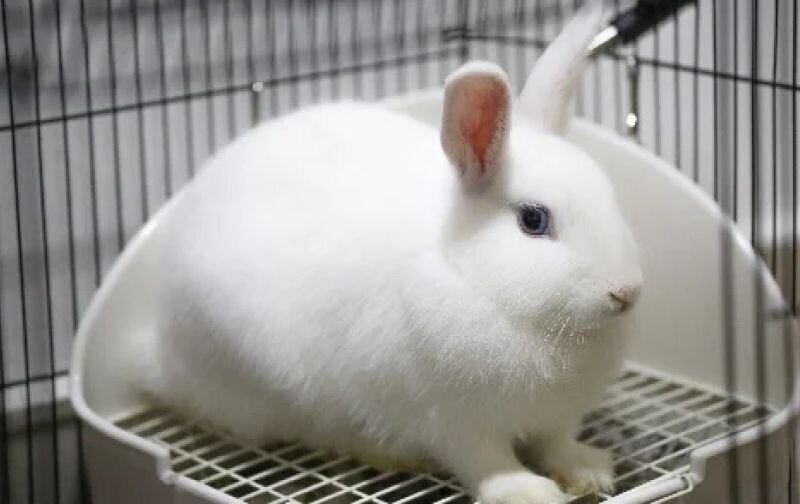
Trying to "mate" with your dog, your cat or even soft toys
What they are saying: 'I'm the boss of you!'
This behaviour is part of their social language and a display of dominance, and rabbits that have been desexed may still perform this behaviour, but are less likely to do this to toys, people, or other animals. Rabbits will often perform this behaviour to other rabbits to ensure that they know who is boss, and the roles may switch depending on the inter-rabbit politics and relationships!
Tipping over or throwing their feeding bowl
What they are saying: 'My meal is late.'
Rabbits will quickly learn how to bring attention to themselves when they want something, and bowl throwing and tipping is a common sign that they think their meal service is overdue!
Heavy bowls are best to prevent food wastage and water spills. However, if your rabbit constantly plays and throws their bowls, they may need more environmental enrichment in the form of toys. Rabbits particularly love things they can destroy, such as cardboard boxes and toilet paper rolls. For additional fun, fill a toilet paper roll with food, then wrap it in newspaper and hand it to your bun.
Gnawing at the cage wire
What they are saying: 'Look at me! Let me out please.'
Your bunny is trying to draw your attention, possibly to let you know that they want to get out of their cage NOW! Rabbits should only be kept in cages for a few hours at a time, and we recommend using a playpen-style enclosure that is not only easier to clean and better for bunny, but also customisable to fit your space. It is uncommon for rabbits in an appropriate enclosure to chew at cage bars, and we want to reduce that behaviour as much as possible, as it can predispose to injury and dental problems.
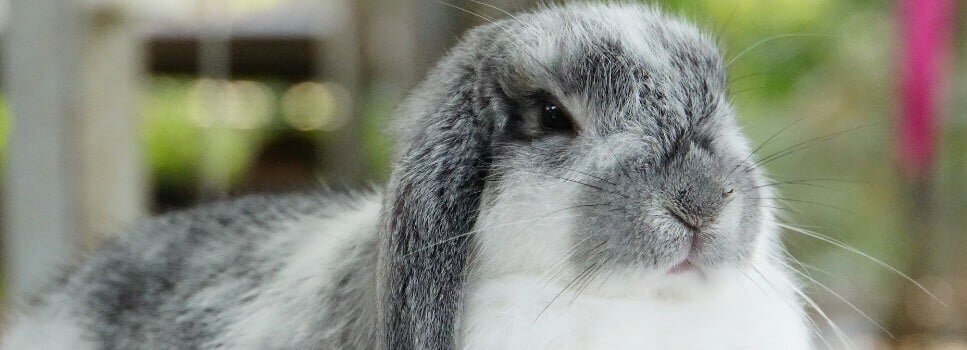
Nose bonking
What they are saying: 'Hello friend!'
Nose bonking, where a rabbit nudges you with their nose, is a nice, friendly way of saying 'hi.' They may also do this to investigate you or other objects, and nose bonking often turns into a grooming or head rub session. If they don't like the thing they've nose bonked, they may elect to throw it!
Urine Spraying
What they are saying: 'I'm hormonal!'
This is often caused by hormones when rabbits reach sexual maturity, and only desexing can solve it. All male and female rabbits should be desexed before they reach a year of age, and it not only has behaviour benefits, but also prevents reproductive cancers, pseudopregnancy, accidental pregnancies, and reduces the risk of inter-rabbit aggression. Plus, when done at an exotics veterinary hospital, the risks are very comparable to that when dogs and cats are desexed.
There are so many more behaviours that rabbits perform that give great insight into their personalities and moods. Spending lots of time at ground level with your rabbit will not only help them trust and learn to interact with you, but also give you access to the best source for learning how to speak rabbit - your bunny!
Further Reading
Want to read more? Check out our other articles:
History
Our experts continually monitor the health and wellness space and we update our articles when new information becomes available.
Wed 21 Mar 2021
Written by Dr Nicole du Plessis BVSc (Hons)Dr Nicole du Plessis BVSc (Hons)
Author, BVSc (Hons)
Dr. Nicole du Plessis is one of Pet Circle's qualified veterinarians and passionate pet care enthusiasts. Dr. Nicole graduated from the University of Queensland in 2016 with a Bachelor of Veterinary Science and worked for a number of years in small animal clinics across South East Queensland before joining the Pet Circle team. Over the years, Nicole has developed special interests in preventative medicine, infectious diseases, small animal medicine and ultrasound.

